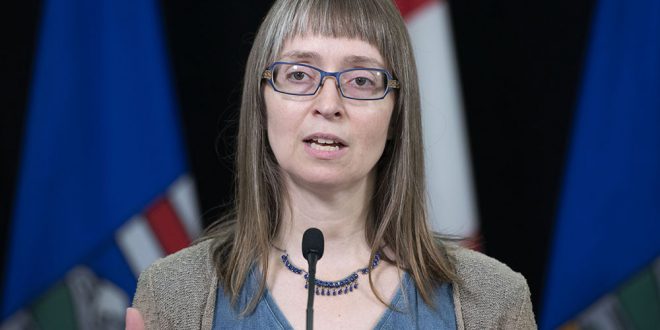Author of the article:
Sammy Hudes
Publishing date:
3 hours ago • 3 minute read

Article content
Active cases of COVID-19 in Alberta continue to rise, with 48 new positive tests reported Wednesday.
That brought the province’s total to 486 active cases, including 224 in Alberta Health Services’ Calgary zone.
We apologize, but this video has failed to load.
Active COVID-19 cases creep upward, but Alberta’s top doctor says virus spread ‘relatively stable’ Back to video
The province’s Edmonton zone, meanwhile, has nearly caught up. There were 201 active novel coronavirus cases in the Edmonton zone as of Wednesday.
A total of 151 people across Alberta have died due to a COVID-19 infection, while 38 people remain in hospital. Of those, seven are being treated in intensive care.
Of the fatalities, the majority of patients had two or more underlying conditions, but some had none, according to chief medical officer of health Dr. Deena Hinshaw. People who died due to COVID-19 infection have ranged in age from 27 to 105, she said.
Hinshaw said the province completed nearly 7,000 COVID-19 tests on Tuesday. Close to 6,900 Albertans infected by the virus have now recovered, representing around 92 per cent of all cases since the pandemic began.
“We are in a new phase of COVID-19 in Alberta,” said Hinshaw, adding her thrice-weekly briefings would likely soon no longer be necessary.
“The spread of the virus remains relatively stable,” she said.
Still, Alberta’s top doctor said the province continues to warn against non-essential travel within the country. Alberta entered Stage 2 of its relaunch on Friday, but unnecessary visits to other provinces are discouraged until it reaches Stage 3.
“Whether or not that changes over the summer is difficult to say,” Hinshaw said.
“I know Albertans want to make plans.”
If Albertans are travelling for essential reasons, they are encouraged to research local guidelines, Hinshaw said. Some provinces and territories, such as Manitoba, require visitors from out-of-province to self-isolate for 14 days upon arrival.
Article content continued
Hinshaw said there is no distinction between travelling by airplane or car under Alberta’s current guidelines.
“For the most part, I would encourage Albertans to stay within the province this summer,” she said.
As Alberta’s relaunch continues, Hinshaw said it’s “natural” to feel anxious. She cited a study released Wednesday by the Centre for Addiction and Mental Health, which showed the ongoing pandemic has had a significant effect on the mental health of people across Canada.
The survey, conducted May 29 to June 1, found around 21.5 per cent of Canadians continued to feel moderate to severe anxiety in recent weeks due to factors such as job losses or fear of the virus.
It polled more than 1,000 Canadian adults online.
“I know that many people are resuming, at least in part, their pre-COVID-19 routines,” Hinshaw said.
“Many people will soon be returning to work or resuming other elements of their daily lives that they had put on hold. For some, this is an exciting step. For others, anticipating this change may be causing moderate or even severe anxiety.”
Hinshaw said anxiety can be triggered by change and uncertainty.
She encouraged Albertans to take care of their physical, mental and emotional health by sleeping well, connecting safely with loved ones and exercising or meditating.
“It’s clear that some people are feeling less anxious with time as they come to terms with our ‘new normal,’ ” Dr. David Gratzer, a CAMH physician and attending psychiatrist, said in a news release.
“But some continue to struggle, including with feelings of depression. This suggests that we will have ongoing mental health needs, especially for populations made vulnerable, like those who are unemployed, and those who are involved in front-line work or are at risk of getting severely ill.”
shudes@postmedia.com
Twitter: @SammyHudes
 The Argus Report Read about it!
The Argus Report Read about it!





